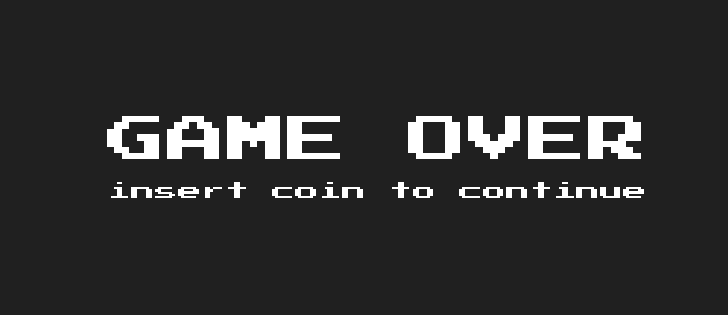You found your core gameplay mechanics, you have nice graphics, the game is running smoothly, after completing the single player campaign (or even in the middle of it), players just drop your game. Are there any ways to increase the replayability? Why, yes, yes there are.
Every single video game is based of a core loop, an action required to complete the game goal that the player will do over and over again. For platform games, it will be running and jumping, for strategy games it will be giving orders to units, for first-person shooters it will be about clicking on targets. However, the boredom specter is never far. Game designers have to come up with creative ways to entice the player to perform the core loop as much as possible. This is what I mean by replayability.
The following ways are ordered by their decreasing expensiveness to add to a game.
Multiplayer
This is the most obvious one as it is also the most expensive feature to add to a game. Ranging from a simple highscore table to a real-time online virtual world, multiplayer features add either competition, cooperation or both between real players. Wether it is to increase its own clout or just to spend a good time with friends, players will want to play the game not just for the sake of it. No wonder it is one of the most frequent requested features on the Early Access games forums.
Artificial Intelligence
If you can't or won't add multiplayer features, fake it! It is less expensive than actual multiplayer features, but not by far. To be actually efficient, any AI should be sufficiently challenging and not cheat too much nor be too predictable in order to reach that goal. Sure, Artificial Intelligence is piggy-backing upon existing gameplay features, but it takes a significant amount of work to get it right. A good example is Valve's Dota 2 [fr] bots that are way more challenging than in Riot's League of Legends [fr] or Blizzard's Heroes of the Storm.
Mods
You can't grant every single change or feature request from your player, why not giving them the actual possibility to implement them? This feature is tricky because it has to be thought out from the very beginning of the project. There is very little chance to be able to add modding feature at a reasonable cost if it wasn't planned initially. However, if it was, it is relatively straightforward. Usually the main game will itself be a sort of standalone mod of the game engine. It also is a great way to foster a creative community which will indirectly increase the replayability of the game. Successful examples range from RPGs like The Elder Scrolls to strategy games like Civilization.
Random drop and cosmetic items
This may seem like a gimmick, and on some ways it is, but it is undeniably effective to sustain a video game and even bring in some revenue without having to resort to subscription or even having to sell the original game. Valve is now well-known to have pulled this card successfully at least twice, first with Team Fortress 2, informally known as Hat Fortress 2, then with Dota 2, whose set amount of heroes each have multiple skins, many of them being available only as a random drop by playing online or given as rewards for special events. Both games are free-to-play without any paywall, and yet Valve is making money, mainly out of cosmetic items and tournament ticket sales. Cost-wise, cosmetic items are pretty easy to implement in the vast majority of cases, but the sales/trade part can become tricky as with everything related to real money being spent online.
Achievements
Maybe I should have added "Meaningful Achievements". Getting an achievement for completing the tutorial doesn't help your game's replayability that much. On the contrary, if you know about a rare situation happening in-game or a difficult optional goal like finishing a level in a certain amount of time, or winning unharmed, those are very good candidates for achievements. In general, I feel like their full description should be published, as secret achievements eventually get vented on wikis or gamer's forums. Consisting only of a few checks for completion added here and there, achievements are inexpensive and can usually be even added post-launch without significant game rework.
Disabling features
This one may be my favorite, as it is one of the least expensive ways of making your game last longer and probably one of the most overlooked. Whatever the game, most players will try to find the most efficient way of reaching the game goal. It could be figuring out what weapon suits any playstyle the best, finding the game-breaking combo, or just a preferred way of playing, even though the game offers many others ways. Adding a level where a certain game feature is disabled forces players to try something new, to get out the sweet spot they found and renew the challenge.
As a personal preference, I prefer this way instead of artificially ramping up the difficulty up to absurdity. If a combo I'm proud of isn't working on the highest difficulty level, chances are I'm going to drop the game instead of trying a new way just because the same obstacle is now that much higher. But if you present me with the same obstacle but one of the element of my combo isn't available any more, I'll much rather find a new way of overcoming the obstacle because the initial situation has changed.
As a general counter-example, Tropico 4 very rarely restricts the building selection available to the player, and instead makes up those increasingly hard (or long) to reach goals. Fortunately, the same method can usually win every single game, which made me completely ignore the Modern Times DLC that just adds new missions and a few buildings replacing the existing ones. But the same build order still applies, failing to renew my interest for the game.
Conclusion
While they're always not directly related to the actual gameplay, there are a number of feature considerations to be made when undertaking a video game development project. One of them is how much players will want to play your game over and over again. The different ways to achieve a good replayability depicted in this article aren't the only ways, but I feel it's a good start for game creators.
(Thumbnail created from two icons created by Sergiu Bagrin and published on Flat Icon)







Disabling feature is, I think, one of the most undervalued item in this list by game designers. I'd like to see, instead of "New game+" mode, some actual "New Game-", with a difficulty increased not just because ennemies have more hitpoints/ammo/weapons, but because you must solve the same challenges with less tools at your disposal.
One of the few but cool enough example of that kind of way to add replayability was Metro Last Light and its well thought (but very poorly marketed/advertised with that pre-order only, then DLC, to have it...) "Ranger's Mode". The game would be harder, and the UI would completely go away, so that you had now to rely only on what you see/hear for spotting enemies, and you have to count/take care of your ammunition by yourself instead of checking a number on your screen. I believe masks' oxygen reserve was harder to check as well. Overall, it felt way more immersive, harder in a good way (it's not just hitting 20 times an enemy instead of 10), and overall very satisfying new experience of the same game. It was also kind of interesting, as the "tool" they remove is not an in-game item, or a skill, but the user interface.
I'm so glad you agree with me on this point and provide a meaningful example of it. My initial article idea stemmed from the disabling feature idea, but I felt it wasn't enough meat for a single article, so I added some more bullet point to compare expensiveness. Congratulations on finding the hidden gem and thanks for the comment!
Map editor
A map editor is by no mean a cheap way to increase replayability. However it's a much effective one. It turns the player (consumer) into a co-creator (producer) that will eventually create more players as a cascading effect.
I heartfully agree, enabling/disabling features is a direct yet effective way to increase game life-time for the hardcore gamers. It can even help weak players to tweak the difficulty !
My most striking example is DUNE 2000 solo multiplayer. Some friend asked me:
My answer was "Enable more sandworms". Why ?
Because sandworms will eat more IA spice-harvesters than human-player harvesters. Typically a human-player place elite-troopers near spice-field and that's sufficient to repel many sandworms. But the IA won't do that. Thus IA will have much less income than player, thus produce less units, leaving the human player with a valuable competitive advantage.
Map editor is indeed a good albeit expensive way to increase the replay value of a game. Nonetheless, it applies to a somewhat limited subset of video games, and I would attach it to the broader way that I named "Mods". Mods can be defined as any user-generated content. A better way to generalize "Map editor" would probably be editor-provided modding tools.
You are absolutely right, a map editor has to be thought out from the very beginning of the project and the main game will itself be a sort of standalone mod of the game engine behind it.
So the map editor case is already covered by the broader mods qualification. I didn't see that because i am much more acquainted with map editors than with game modding.
Hi all,
I have the feeling which the games without storyline mode have better a replayability, quite simply because when the history of a game is finished, the interest is some dramatically degraded.
In "Open SP" games, it is the player who definite objectives, so the game it's virtually infinite replayability.
Other thing, Rogue-Likes is maybe the king of replayability, because "game over" is in important part of game mechanics.
Mods always a good way to improve replayability, take vanilla Freelancer (20h to play), and take Bigdaddy openSP mod, finally you have 100h to playing
Oh nice title !
At this point, it's a matter of personal taste about the existence of a storyline or not. People don't play video games for the same reasons, and a lot of people are thrown off if there's no story at all, however basic.